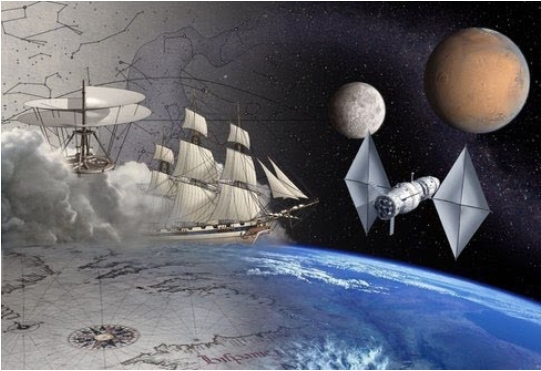
Image Credit: Contributed by author
November 10, 2015 - 7:55 AM
As the movie "The Martian" led box offices for the fifth week in a row, on the heels of movies like “Interstellar” and “Gravity,” isn't it time to ask why people are so attracted to the idea of space exploration?
Brent Lang, Variety magazine's senior film and media reporter, suggests the interest is because this recent spate of space movies are connected to us, here in the early 21st century: "[the recent movies] are set, in some cases, in the future, but one that is recognizable to our own time - an age when knowledge of botany is a more potent tool for outer space survival than laser guns or teleportation devices." I think this is an important point. We see ourselves in the personas of Mark Watney (Matt Damon - The Martian) and Ryan Stone (Sandra Bullock - Gravity) because their situations are imaginable in the here and now, using our technology as it exists, if not today, certainly early tomorrow morning. They are us, in the potentiality of the very near future.
But our attraction to space adventurism didn't start in the 2014 movie season. It started well over a century before with writers like Jules Verne, and it solidified decades ago with a speech in 1962 by President John F. Kennedy: "We choose to go to the moon. We choose to go to the moon in this decade and do the other things, not because they are easy, but because they are hard, because that goal will serve to organize and measure the best of our energies and skills, because that challenge is one that we are willing to accept..." And with that, men who were born not long after Kitty Hawk went to the moon and back.
We took a step back in the early 1970s, and over the next few decades allowed ourselves and our children to become mired in various earthbound apocalyptic imaginings. Our children have been subjected to this stifling negativism ever since, whether it be in the form of anti-capitalism masquerading as "environmental" concerns or anti-technology in the guise of "sustainability," all with the net effect of supplanting the dream of exploration with planetbound crisis mongering.

Image Credit: Contributed
But there remained under the surface a hunger for new frontiers. A decades-long attraction to science fiction epics like "Star Trek" and "Star Wars" persisted, with their storylines removed from us in space and/or time by orders of magnitude, using technology centuries ahead of us, involving fantastical beings, often straining at the seams of plausibility. Each new iteration of these movies was a blockbuster in its own right, with a wide, deep and persisting following. Perhaps it is because we see our own ambitions not only in the immediate future, but through the mists of the very far future, amidst the stars, standing on new shores, planting the flag of humanity on new terra. Perhaps it is too because we see ourselves, our adventurous selves, our better selves, in people like James Kirk and Luke Skywalker.
It is telling that the science fiction movies that last well beyond their initial showings tend to be optimistic in outlook.
We in the west have always been adventurous, and I suspect our attraction to these strains of science fiction is in part a resurgence of western hopefulness, a revival of forward and outward movement, a spirit of human Progress, the spirit of adventure that fired the minds of the late Victorians and persisted through two world wars and into the mid 20th century, overwhelming for at least most of the century the seductive, enervating impulse of Marxian idealism. It is the same spirit that took Hillary to the top of Everest, Livingston to darkest Africa, Man to the moon. It's an optimism in stark counterpoise to the dreary stream of dystopian pseudoscience coming from climate alarmists and assorted doomsayers here on earth these last few decades.

Image Credit: NASA
Perhaps we are on the cusp of another wave of popular scientific optimism, similar to the boundless exhilaration that took us to the moon and back. Perhaps the 21st century will see us not only land on Mars, but establish bases there. Perhaps this century will see us establish our presence elsewhere across our heliosphere, mine the asteroids, begin to harvest the plenty in the few square miles around our planet. Perhaps, and I can only hope, it will see us set the stage for our leap to the stars early in the century after that.
— Scott Anderson is a Vernon City Councillor, freelance writer, commissioned officer in the Canadian Forces Reserves and a bunch of other stuff. His academic background is in International Relations, Strategic Studies, Philosophy, and poking progressives with rhetorical sticks until they explode.
News from © iNFOnews, 2015